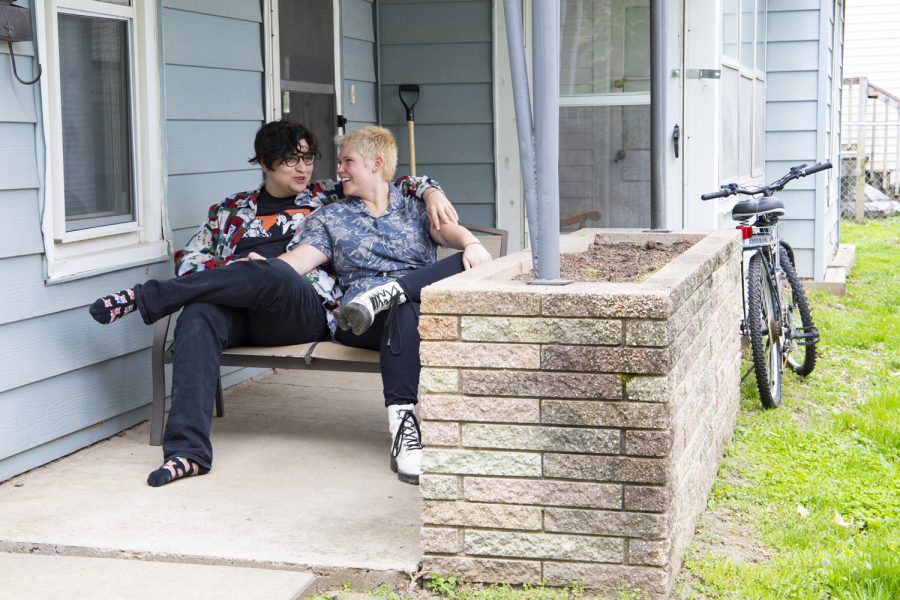Love in the time of COVID-19
Due to social isolation and safety precautions during the COVID-19 pandemic, relationships have had to adapt in interesting ways.
Daily Iowan reporter Naomi Hofferber poses for a portrait with Judd Barron on Monday, May 4, 2020 in front of Judd’s house in Iowa City, where they currently live.
May 4, 2020
If you would have told me in January that I would now be living in social isolation with a boyfriend at his house, I would have never believed you.
A little over two months ago, I met a boy off a dating app in a bar. We shared a drink, talked about classes, laughed at each other’s jokes, and had what could widely be considered a successful first date. We met up later that night, and planned a follow up date that Wednesday.
We ended up hanging out the very next day instead — and every day since for a month.
And then, the COVID-19 pandemic hit. We went home to our respective parents houses, and talked each day about what we planned to do. The way I saw it, I had three options.
I could stay with my parents, sleeping on the couch with no space for myself, I could go back to my apartment, where I shared a kitchen, bathroom, and communal space with seven other mostly-strangers, or I could move in with my boyfriend, who I had been dating for one month.
When he told me that his roommate was going to stay at his parents house during this situation, we decided we would, for all intents and purposes, live together through this pandemic, despite knowing each other for just over a month.
The COVID-19 pandemic has put an interesting new pressure on relationships. With articles from the Wall Street Journal to the Cosmopolitan looking at the question, “Do you quarantine with your significant other?” the tension between following dating norms and having extra safety during an unprecedented pandemic is significant.
Despite this dichotomy, we’re coming up on a month and a half of living together, and it’s been easier than anticipated.
University Counseling Service therapist Ian Evans said for those in relationships who moved in with their S.O. to social isolate, open communication is the key,
“I think this is key for any relationship; the importance of communication. When you’re living together, one of the things you’re going to see is communicational boundaries,” he said. “Two people are going to have two different preferences. Think about all the individual intricacies and our quirks that we carry with us on our day to day living.”
While my boyfriend and I were lucky to be in an interesting situation where isolating together made sense, for some in established relationships, COVID-19 meant unexpected distance.
Tessa Albaugh, a graduating senior from the UI, has been separated from her boyfriend of two years since the university moved classes online. He is slightly immuno-suppressed due to another condition, and both of them are living at home — away from one another — with members of their family who are part of vulnerable groups to the virus.
The last time Albaugh saw her boyfriend, she thought she would see him four days later.
“I wish I had been able to spend more time with him, and to not be able to plan when I can see him next is difficult emotionally,” she said. “We’re both scared for each other, we’re scared for each other’s safety and health.”
Albaugh uses video calls to stay in touch with her boyfriend, and said that face to face interaction helps a lot.
For those who are single in the time of corona, even leading immunologist Anthony Fauci hasn’t ruled out the dating world, primarily through apps. He stated in Vanity Fair, “If you’re willing to take a risk — and you know, everybody has their own tolerance for risks — you could figure out if you want to meet somebody.”
Nina Astorino, a graduating senior at Harper College in Illinois, has been seeking out a connection over dating apps such as Hinge and Facebook Dating during this time. She said she’s noticed a lot of new members on dating apps, and that because people can’t meet up in person, it’s providing a time to get to know one another.
“You can take your time,” she said. “You get to know people, and then if you decide that you don’t want to meet that person after social isolation, then you don’t have to.”




